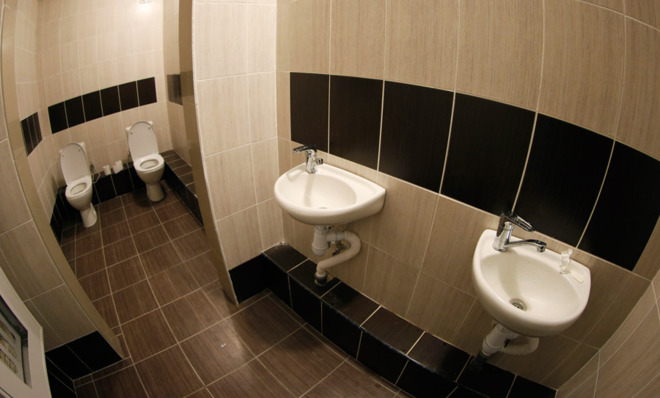Why Sochi's terrible bathrooms are the perfect symbol for Putin's Olympics
Something stinks in Sochi, and it's not just the shoddy plumbing


A free daily email with the biggest news stories of the day – and the best features from TheWeek.com
You are now subscribed
Your newsletter sign-up was successful
A last-minute sprint to complete vast infrastructure projects for the Olympics is as much a staple of the Games as the events themselves. But Sochi, Russia, has taken it to the next level this year, ending up with some puzzling facilities that give the old bathroom at CBGB's a run for its money.
A "peculiar mix of grandiosity and bungling" defines the accommodations, writes The New York Times' David Segal, which should be thought of "not as hotels but rather as a rare opportunity to experience life in a centrally planned, Soviet-style dystopia." Though there are many construction follies to nitpick — missing light bulbs, broken elevators, uninstalled heating systems, and so on — none more perfectly exemplify the Sochi Games' number one problem (ahem) than its terrible, wacky bathrooms.
A few examples, from bemused athletes and media members:
The Week
Escape your echo chamber. Get the facts behind the news, plus analysis from multiple perspectives.

Sign up for The Week's Free Newsletters
From our morning news briefing to a weekly Good News Newsletter, get the best of The Week delivered directly to your inbox.
From our morning news briefing to a weekly Good News Newsletter, get the best of The Week delivered directly to your inbox.
The flagrantly shoddy construction isn't just a problem for visiting athletes. It's also reflective of a bigger problem with the Games and Russia at large, exposing the rampant corruption and abysmal mismanagement that have become hallmarks of Putin's reign.
With a $51 billion price tag — quadruple Russia's original estimate — the Sochi Games are by far the most expensive in history. For comparison's sake, that's well over the then-record $40 billion China spent on the 2008 Olympics in Beijing — even though the Summer Games feature roughly three times as many events. A Businessweek estimate pegged Beijing's cost per event at $132 million; Sochi is spending $520 million per event.
Partly at fault for the skyrocketing price tag is Sochi's subtropical climate. It turns out that transforming a beach resort town into a snow-covered paradise costs a lot of money.
But the biggest factor is good old-fashioned cronyism.
A free daily email with the biggest news stories of the day – and the best features from TheWeek.com
Putin's associates have pocketed as much as $30 billion of Sochi funds, according to a report by Boris Nemtsov, an opposition leader and former deputy prime minister. All that "stolen" money, he said, proves the Games are an "unprecedented thieves' caper in which representatives of Putin's government are mixed up along with the oligarchs close to the government."
For instance, the company of one Putin friend, his former judo partner, received $7.4 billion for various development projects — or more than the entire price tag for the 2010 Vancouver Olympics. And Sochi's most expensive contract, an $8.7 billion rail and roadway construction deal, went to Russian Railways, the state rail company headed by another Putin pal. For that enormous price, the Russian edition of Esquire estimated, builders could have paved the road with caviar, oysters, or fur coats.
"Athletes are not the only people who compete in Sochi," says a report by the Anti-Corruption Foundation. "Officials and businessmen also took part in the Games and turned them into a source of income."
In other words, when oligarchs and the government share a bed, everyone else has to share a bathroom.
Watch a montage of Sochi's foibles here:
Jon Terbush is an associate editor at TheWeek.com covering politics, sports, and other things he finds interesting. He has previously written for Talking Points Memo, Raw Story, and Business Insider.
-
 Political cartoons for February 21
Political cartoons for February 21Cartoons Saturday’s political cartoons include consequences, secrets, and more
-
 Crisis in Cuba: a ‘golden opportunity’ for Washington?
Crisis in Cuba: a ‘golden opportunity’ for Washington?Talking Point The Trump administration is applying the pressure, and with Latin America swinging to the right, Havana is becoming more ‘politically isolated’
-
 5 thoroughly redacted cartoons about Pam Bondi protecting predators
5 thoroughly redacted cartoons about Pam Bondi protecting predatorsCartoons Artists take on the real victim, types of protection, and more
